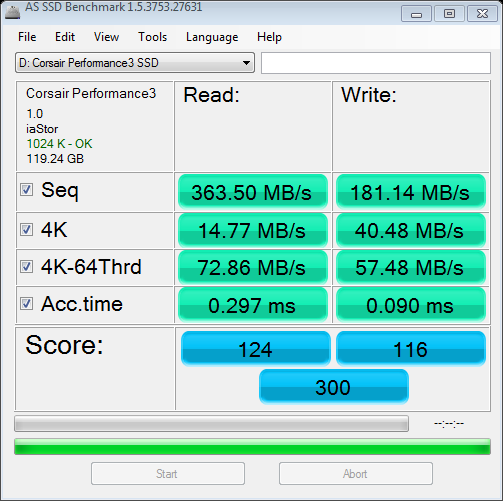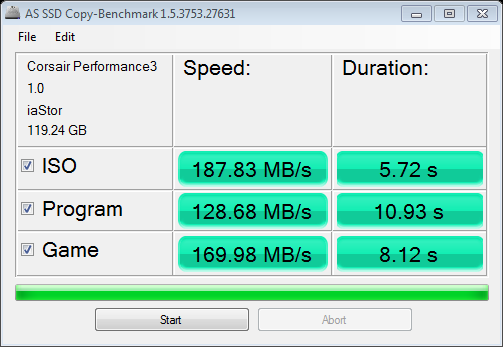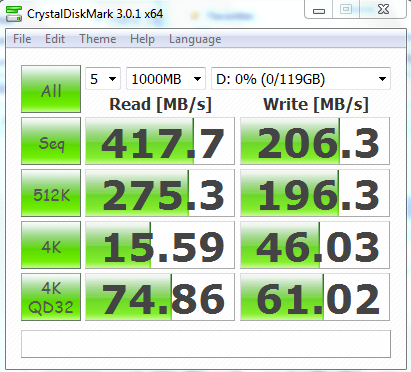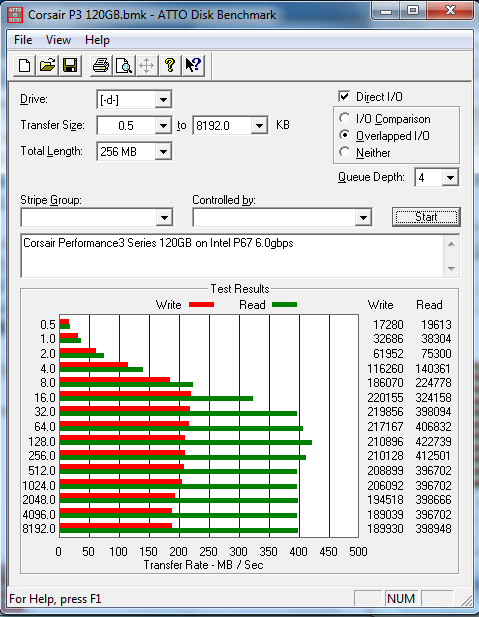Corsair’s Performance 3 series is a newer SATA III 6.0gbps drive that offers quite a bit of performance utilizing a Marvell controller. Marvell has been making a splash lately on SSD controllers. The Micron C300 held the performance crown for almost a year as its competitors were capped by SATA II bandwidth constraints. Today we will look at the Corsair Performance 3 Series P3-128 drive that utilizes custom tweaked firmware and does achieve speeds well above what SATA II can offer. Note this is the same physical controller used in the Intel 510 SSD released this week.
With Marvell based drives, one needs to take particular care to look at benchmarks from the size of drive that a user is looking to purchase. The 256GB drives tend to perform better than the 120GB/ 128GB drives while the 64GB drives are the slowest of the bunch. From what I have seen,the P3-128 follows this trend. One word on formatted capacity, the P3-128 has 128GB of NAND but has a Windows 7 formatted capacity in excess of 119GB. That is a very respectable result and better than the newer SandForce SF-1222 25nm NAND SSDs. When doing price/ GB comparisons, it is important to use the formatted capacity not the total amount of onboard NAND.
Test Configuration
I am using a Sandy Bridge test bed here as the Cougar Point SATA 6.0gbps controller is perhaps the best 6.0gbps SATA controller on the market at the moment.
- CPU: Intel Core i5-2500K
- Motherboard: ASUS P8H67-M EVO
- Memory: 8GB 1600MHz CL9 DDR3 (4x2GB)
- OS Drive: OCZ Agility 2 120GB
- Additional Drives: Corsair Performance 3 Series P3-128
- Additional NICs: Intel Gigabit CT PCIe x1 network adapter
- Enclosure: Supermicro SC731i-300B
- Power Supply: Supermicro 300w (included in the SC731i-300B)
One important note here is that the P3 120GB benchmarks were much lower when I tried the drive under IDE mode. As with any modern SSD, set the controller to AHCI mode or RAID mode for best performance. Also, installing the Intel RST 10.xx series drivers over the default Windows 7 drivers showed a nice performance gain.
The Tests
It is important, especially with SSDs not to take a single test result at face value. One should look at a few different tests to get an idea of how the drives perform in different scenarios. To this end, AS SSD benchmark, CrystalDiskMark, and ATTO all show different facets of performance.
AS SSD Benchmark
AS SSD is a solid benchmark that does not write compressible data to drives. The result is perhaps one of the best workstation SSD benchmarks available today.

Sequential reads and writes are significantly better than the SandForce SF-1220 based drives (~60MB/s) but 4K numbers including the 4K-64Thrd results do fall behind the SandForce SF-1222 based drives. I also wanted to see the AS SSD copy bench just to check some typical speeds. Access times are fairly good also.

Overall, not a bad result, and users that do a lot of sequential transfers of non-compressible data will see some benefit over other drives.
CrystalDiskMark
CrystalDiskMark is another benchmark which gives non-compressible read/write numbers.

These figures show the same pattern seen in AS SSD where the 4K performance is the drives weak point. It should be noted that in the sequential and 512K tests, the Corsair Performance 3 Series P3-128 drive managed anywhere from 50-100% higher performance than the G.Skill Phoenix Pro 60GB, which is impressive.
ATTO Benchmark
ATTO shows some fairly strong performance, I will note that the value of the ATTO benchmark is really to show the best-case scenario. ATTO is known to write highly compressible data to drives, which inflates speeds of controllers that compress data like SandForce does prior to writing.

Overall, solid results, much higher than SATA II drives offer since the Corsair P3-128 is reaching speeds in excess of 400MB/s at times, similar to what was seen in CrystalDiskMark and AS SSD for sequential speeds.
Conclusion
Overall, the Corsair Performance 3 Series P3-128 (119GB formatted) drive is fast, and does provide a viable alternative to SATA II based drives and the C300. From initial benchmarks, it does look like the Intel 510 based drives will be a bit faster on sequential reads (rated at up to 450MB/s sequential read, 210MB/s sequential writes) so competition in the SSD market has generally yielded price decreases for end users.




Why no word about IOPS, which is much more important for SSD performance than sequential reads/writes? I mean, who is copying enormous files on an SSD?
Hi Moondust, IOPS are very easy to calculate from MB/s figures on single disk arrays. IOPS * TransferSizeInBytes = BytesPerSec
So, for example, in the AS SSD figures above, the sequential reads are around 22-23IOPS (given 16MB transfer), the 4K-64Thrd reads are just over 18,500 IOPS and etc.
Another thing is that both 4K and sequential numbers are important for SSDs, as well as transfer sizes in between. The main perceptible difference that people coming to SSDs from mechanical disks feel is the 10x or greater 4K speeds though. Having used just about every controller over the past year or two in single drive and RAID 0 configurations, I will say that one would be hard pressed to notice a difference between two “decent” SSDs in normal workstation workloads. What I notice the most is copying files to Intel X25-V 40GB drives where they can only write at speeds 1/3 that of GigE.